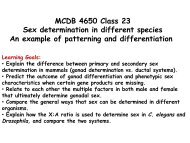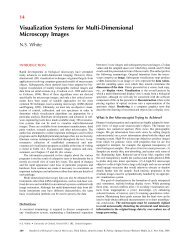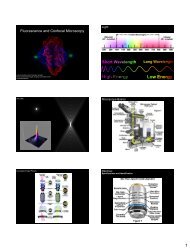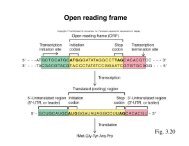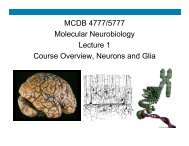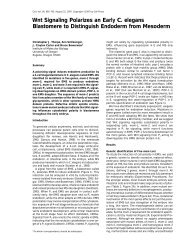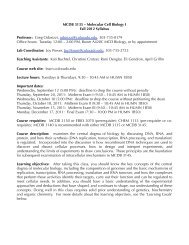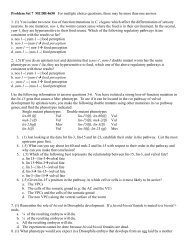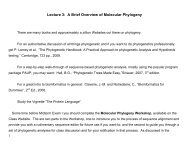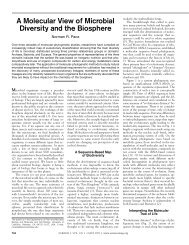2012 Program Booklet - MCD Biology - University of Colorado Boulder
2012 Program Booklet - MCD Biology - University of Colorado Boulder
2012 Program Booklet - MCD Biology - University of Colorado Boulder
Create successful ePaper yourself
Turn your PDF publications into a flip-book with our unique Google optimized e-Paper software.
Jeffrey Settleman, PhD<br />
Senior Director, Discovery Oncology<br />
Genentech<br />
Title: The Many Flavors <strong>of</strong> Resistance to<br />
Anti-‐Cancer Drugs<br />
Saturday, October 13<br />
3:15 – 4:00 pm<br />
JSCBB Butcher Auditorium<br />
Abstract:<br />
The recent clinical success experienced with several “rationally-‐targeted” anti-‐cancer drugs, such as<br />
the kinase inhibitors imatinib, erlotinib, crizotinib, and vemurafenib, has defined a paradigm shift in<br />
cancer therapy. However, despite the sometimes impressive clinical activity associated with these<br />
agents, progression during therapy is inevitable due to the acquisition <strong>of</strong> drug resistance. For many<br />
drugs, specific genetic mechanisms <strong>of</strong> resistance have been elucidated, and pre-‐clinical findings<br />
implicate additional non-‐genetic mechanisms. Moreover, accumulating evidence implicates<br />
heterogeneity within cancer cell populations in the response to drug treatment, posing an additional<br />
challenge to the development <strong>of</strong> effective cancer therapeutics.<br />
While modeling the acute response to various anti-‐cancer agents in drug-‐sensitive tumor cell lines, we<br />
consistently observed a small subpopulation <strong>of</strong> reversibly “drug-‐tolerant” cells. This drug-‐tolerant<br />
phenotype, associated with a distinct chromatin state, is transiently acquired and relinquished at low<br />
frequency by individual cells within the population, implicating the dynamic regulation <strong>of</strong> phenotypic<br />
heterogeneity in drug tolerance. The drug-‐tolerant subpopulation can be selectively ablated by<br />
treatment with chromatin-‐modifying agents, potentially yielding a therapeutic opportunity. These<br />
findings suggest that cancer cell populations employ an epigenetically-‐regulated dynamic survival<br />
strategy in which individual cells transiently assume a reversibly drug-‐tolerant state to protect the<br />
population from eradication by potentially lethal exposures.<br />
Cancer cells typically express multiple receptor tyrosine kinases (RTKs) that mediate signals that<br />
converge on common critical downstream cell survival effectors -‐ most notably, phosphatidylinositol<br />
3-‐kinase and mitogen-‐activated protein kinase. Consequently, increased RTK ligand levels, via<br />
autocrine tumor cell production, paracrine contribution by tumor stroma, or systemic production,<br />
could confer resistance to inhibitors <strong>of</strong> an oncogenic kinase with a similar signaling output. Using a<br />
panel <strong>of</strong> kinase-‐“addicted” cancer cell lines, we found that most cells can be “rescued” from drug<br />
sensitivity by simply exposing them to one or more RTK ligands. Among the findings with clinical<br />
implications was the observation that hepatocyte growth factor confers resistance to the BRAF<br />
inhibitor vemurafenib in BRAF mutant melanoma cells. These observations highlight the extensive<br />
redundancy <strong>of</strong> RTK-‐transduced signalling in cancer cells and the potentially broad role <strong>of</strong> widely<br />
expressed RTK ligands in innate and acquired resistance to drugs targeting oncogenic kinases.




